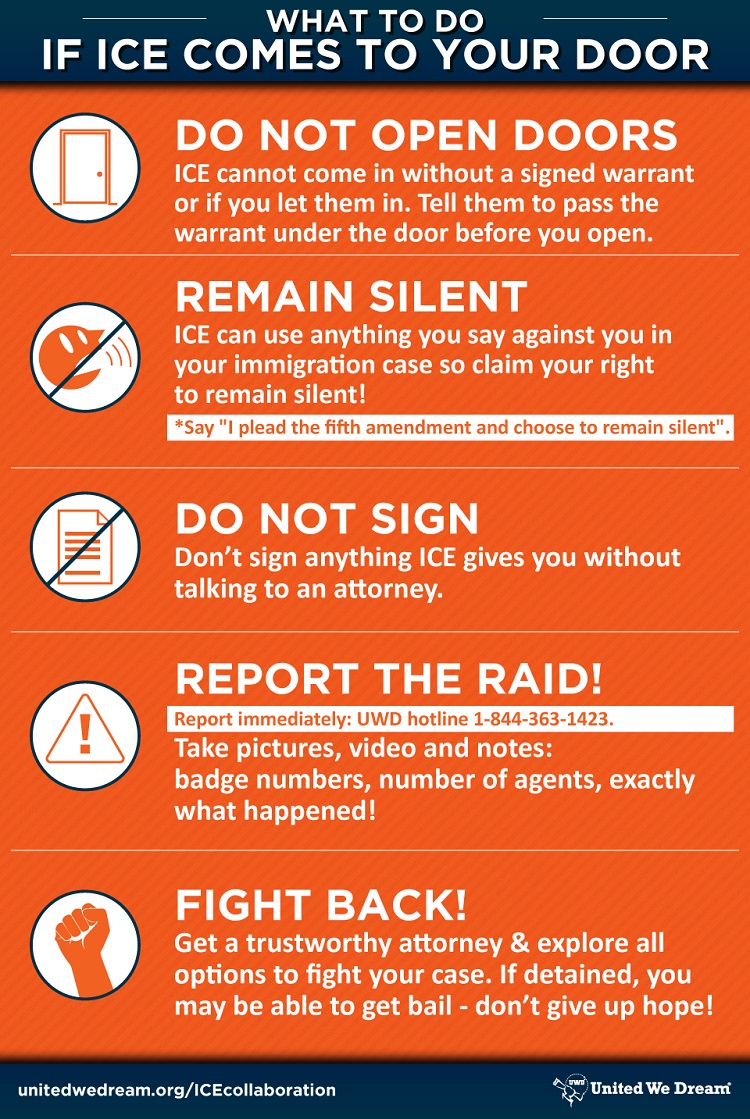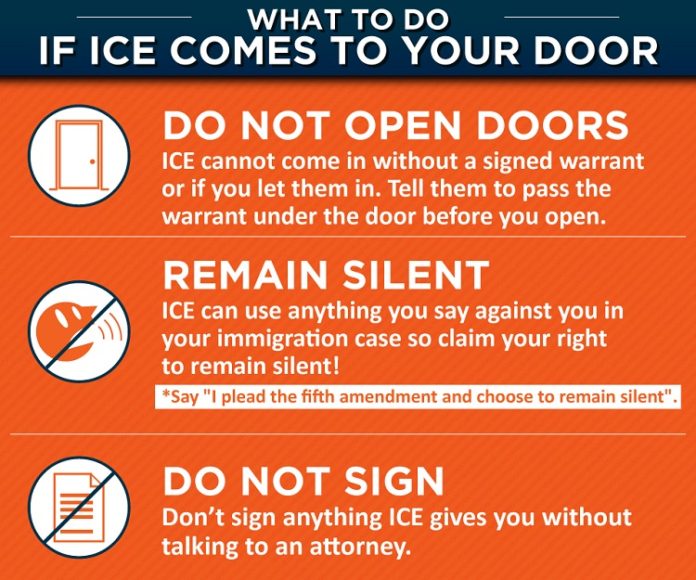The series of raids over the last 10 days by agents of the U.S. Immigration and Customs Enforcement (ICE) agency has some Perry residents worried about possible immigration raids here in the heartland.
ICE arrests have so far been were reported in California, Florida, Georgia, Illinois, Indiana, Kansas, Kentucky, Maryland, Missouri, New York, North Carolina, Oklahoma, South Carolina, Texas and Wisconsin.
Department of Homeland Security Secretary John Kelly called the raids “a series of targeted enforcement operations,” but Donald Trump’s language was more pointed: “The crackdown on illegal criminals is merely the keeping of my campaign promise,” the president tweeted Sunday.
Immigration-reform activists praised the ICE “enforcement surge,” saying the raids only target immigrants who are in the country illegally and have criminal records.
Immigrant advocacy groups contend the government has rounded up large numbers of non-criminals as part its stepped-up enforcement.
“We’re going to focus on public safety and saving American lives, and we will not apologize,” said Senior White House Advisor Stephen Miller Sunday.
Reaction among Perry’s immigrant population appears to be varied, if a small series of random interviews conducted this week by ThePerryNews.com gives any indication.
“People are talking about it,” said Lacaro Chavez of Perry Sunday morning as he sipped coffee outside the Casey’s General Store. “They’re worried.”

Jose Calderon of Perry said he was at a family reunion last weekend, and people were talking about the ICE raids and about the anti-immigrant feeling in the air since the election of Trump.
“There’s not much we can do right now,” Calderon said, “except wait and see what happens. There’s lots of changes very fast and some maybe not so good.”

Jorge Aguilera of Phoenix, a 30-year legal resident of the U.S., owns a construction company that is here for a project at the Tyson Fresh Meats plant in Perry. Aguilera said many employers rely on immigrant labor and would be harmed by a massive deportation.
“Contractors need people,” he said Sunday, “and they can’t always afford to pay $14 or $15 an hour. It’s okay if they catch the criminals, but a lot of people are honest working people. They make a contribution to America.”

Rosa Gonzalez of Perry, a family life and human sciences specialist with Iowa State University Extension and Outreach, said she has “not heard too much talk” about the latest ICE raids.
Similarly, Alberto Olguin, human resources director at Tyson Fresh Meats in Perry, which employs many immigrant laborers, said people are generally calm, and nothing has happened yet to cause anxiety.

“We haven’t heard anything yet,” Olguin said. “I just hear the news like anybody else, but nothing is different here.”
On the other hand, Tim Farmer of Perry, an immigration lawyer with the Trey Sucher Law Firm in Perry, said people have been coming to him with questions and concerns since the Trump campaign took its anti-immigrant turn.

“People have a lot of concerns,” Farmer said. “I’ve had a number of people ask me questions about the new administration. They’re worried about it, and there’s just a lot of uncertainty. They just don’t know what Trump might do.”
He said he fielded a lot of questions right after election and then again when the Trump regime issued its Muslim travel ban. Farmer said misinformation circulating in the immigrant community also causes anxiety, such as the permanent resident from Mexico who asked Farmer whether a speeding ticket would cause his deportation.
“So, yeah,” Farmer said, “people are worried. Absolutely. They’re concerned.”
The recent immigration raids have been conducted by ICE’s Office of Enforcement and Removal Operations, with help from other Homeland Security divisions, the U.S. Marshals Service and sometimes with the cooperation of state and local law enforcement agencies.

Perry Police Department Chief Eric Vaughn said his agency does not regularly inquire into the residency status of people who come in contact with his department.
“We’re under no requirement to do that,” Vaughn said. “Am I aware that people are here without proper documentation? Yes, absolutely. But I guess it’s not my job at this point to make a determination whether somebody’s documented or undocumented. Until they come into a criminal contact with me, it really doesn’t matter to me. And if they’re a victim, they’re a victim. I really don’t care about their documentation either. And that’s one of those things that we’ve had a tough time getting over in Perry. We need those people to come to us when they become victims, and we don’t want them to be afraid to come to us just because they might not have citizenship or the right documentation. We want to help them whoever they are.”
Vaughn said he has seen the enforcement of immigration laws vary over the years according to the political climate of the time.
“We have perpetuated this problem over the last 100 years,” he said, “and have in a way created this situation as a government and have ignored the problem with undocumented people coming here. But we’ve created a greater problem. Now we have families living here, mixed families where maybe mom and dad are undocumented but the children have lived here and were born here. So if we start enforcing this issue now, it just makes it very, very complicated. What do we do? Do we send the whole family back when those younger kids might in fact be citizens, or do we keep those kids here with their families and work through some type of residency or citizenship program? I don’t know. We’ve used that labor force for some time to do various things for us during times when we’ve needed the labor.”
The following information from the National Immigration Law Center explains what to do if you are approached or detained by the immigration police.
¿Cuándo puede Inmigración entrar a mi hogar?
Los oficiales de inmigración no pueden entrar a su hogar a menos que tengan una orden oficial (“warrant”). La orden es un documento expedido por una agencia de gobierno o por una corte judicial. Hay dos clases de ordenes: una orden es para cuando vienen a arrestarlo (“orden de detención”) y la otra para cuando el oficial tiene el permiso de un juez para entrar y registrar su hogar (“orden de cateo” u “orden de allanamiento”). El Servicio de Control de Inmigración y Aduanas (“ICE” por sus siglas en inglés) puede expedir órdenes de detención, pero sólo una corte judicial puede expedir una orden de allanamiento.
Si un oficial toca su puerta, no la abra. Pregúntele al oficial, a través de la puerta cerrada, que se identifique. Usted le puede preguntar, “¿Para quién trabaja usted?” o “¿En cuál agencia trabaja usted?”
Es posible que el oficial le conteste diciendo que él trabaja con el “Department of Homeland Security” (Departamento de Seguridad Nacional) o con el “U.S. Immigration and Customs Enforcement” (Servicio de Control de Inmigración y Aduanas, o “ICE”). El oficial pudiera nombrar otra agencia. De todas formas, mantenga su puerta cerrada. A través de la puerta cerrada, pregúntele al oficial si tiene una orden oficial (en inglés, “warrant”).
Si el oficial le contesta que sí, no abra la puerta todavía. Pídale al oficial que le muestre la orden y que se la pase por debajo de la puerta.
Cuando revise la orden, busque su nombre, su dirección, y una firma. Esto le puede ayudar a decidir si la orden es válida o no. La orden estará escrita en inglés. Si usted tiene problemas en leerla o entenderla, pregúntele a otra persona en su hogar que lo ayude a leerla o a traducirla si es posible.
Si la orden no parece ser válida, usted debe devolverla por debajo de la puerta y decir que es incorrecto.
Si la orden que el oficial le enseña parece ser válida, busque en ella a ver si fue expedida por una corte judicial o por el Servicio de Control de Inmigración y Aduanas (ICE).
Si la orden válida fue expedida por el Servicio de Control de Inmigración y Aduanas (ICE) pero no por una corte, usted tiene el derecho de prohibirle al oficial que entre a su hogar. Si la orden es una orden de detención y no una orden de allanamiento, se aconseja que, si usted decide hablar con el oficial, usted salga de su casa para hablar con el sin dejar que entre a su hogar. Esto es muy importante si usted vive con otras personas que tengan problemas de inmigración, pues una vez le haya permitido al oficial que entre a su hogar, el oficial tendrá derecho de hacerle preguntas a cualquier otra persona que esté presente.
Si usted habla con el oficial (recuerde, fuera de su hogar — no lo deje entrar), no conteste ninguna pregunta. No firme ningún papel. Dígale al oficial que usted desea hablar con un abogado antes de decir cualquier cosa. No le provea al oficial ninguna clase de documentación que indique de que país es usted. Asegúrese de nunca cargar con usted ningún documento falso.
Otra manera en la cual un oficial de inmigración puede entrar a su hogar legalmente (además de tener una orden judicial válida) es si usted le da al oficial el permiso de entrar. Esto se llama “consentir” a que entren a su hogar.
Si usted abre la puerta, o si el oficial le pregunta si puede entrar y usted le dice que “sí,” usted probablemente ha consentido a que el oficial entre a su hogar.
Lo mejor que puede hacer es mantener su puerta cerrada y preguntarle al oficial que se identifique. Entonces pida ver la orden. No abra la puerta si el oficial no le muestra una orden judicial.
No le es permitido a un oficial que lo fuerce a consentir a que entre a su hogar. Por ejemplo, si su hogar está rodeado de automóviles pertenecientes a la patrulla fronteriza o Inmigración, y el oficial tiene en sus manos una arma de fuego cuando le pide permiso para entrar a su hogar (cuando le pide su consentimiento), y usted le dice que “sí” porque tiene miedo, es probable que la corte no considere que su consentimiento haya sido válido.
¿Cómo me puedo proteger si llegara Inmigración a mi hogar?
Si usted se entera que la Inmigración ha estado haciendo preguntas en su trabajo o que Inmigración esta conduciendo una investigación en su lugar de trabajo, es posible que los oficiales se aparezcan en su hogar.
Asegúrese de que alguien en quien usted confía sepa donde usted está, y que usted le pueda contactar en caso de una emergencia (si usted es detenido por Inmigración).
Usted y los miembros de su familia deben de tener los números de teléfono de abogados que se especializan en asuntos de inmigración cerca de su teléfono en su casa para que los pueda llamar en caso de que sea detenido.
Generalmente, es una buena idea tener una copia de sus documentos importantes (certificado de nacimiento, papeles de inmigración, etc.) en la casa de un amigo o familiar en quien usted confía y a quien pueda llamar en caso de que sea detenido.
¿Qué debo hacer si Inmigración visita mi lugar de trabajo?
Los oficiales de inmigración no están autorizados a entrar a su lugar de empleo — no importa si es una fábrica, una tienda, un edificio, una finca o un huerto — si no tienen la autorización del dueño o del gerente, o una orden judicial. Si el oficial obtiene autorización, entonces puede hacerle preguntas relacionadas a su situación de inmigración.
Usted tiene el derecho de quedarse callado. En muchos estados, usted no tiene ni que decirle su nombre al oficial. Aunque quizás quiera dar su nombre solamente para que su familia u abogada pueda localizarlo.
Usted también tiene el derecho de hablar con un abogado antes de contestar cualquier pregunta. Su respuesta a toda pregunta que el oficial le haga puede ser, “Yo deseo hablar con un abogado.”
No es necesario decirle al oficial de inmigración donde usted nació o cual es su estatus de inmigración.
No es necesario mostrarle al oficial sus documentos de inmigración ni ningún otro documento. Si el oficial le pide ver sus documentos, usted tiene el derecho de contestar que usted “desea hablar con un abogado.”
¿Qué puede hacer mi unión?
Si usted pertenece a una unión o sindicato, hay varias formas en cual la unión le puede asistir. Usted debe consultar con uno de los representantes de la unión con respecto a sus preocupaciones. Si lo hace sentir mas cómodo, pídale a uno de los otros trabajadores que lo acompañe cuando hable con el representante de la unión. Su contrato con la unión pudiera tener provisiones que protegen a los trabajadores, como por ejemplo acuerdos con el patrón que establecen algunas de las siguientes cláusulas:
El patrón no le permitirá a los oficiales de Inmigración que entren a su lugar de trabajo si no tienen una orden judicial válida firmada por un juez federal o un magistrado.
El patrón le informará inmediatamente a la unión si las autoridades de Inmigración lo han contactado, de modo que la unión pueda tomar los pasos necesarios para informar a sus miembros sobre sus derechos y ayudarles a conseguir asistencia legal.
El patrón le permitirá a los abogados o a líderes comunitarios proveídos por la unión a entrevistar a sus empleados en un ambiente tan privado como sea posible dentro del lugar de empleo. Es posible que la unión tenga un plan legal que le provee abogados especialistas en inmigración a sus miembros.
El patrón promete no revelar los nombres, domicilios o estatus de inmigración de ningunos de sus empleados a Inmigración, a menos que sea requerido por ley.
El patrón no participará en ningún sistema de verificación electrónica (por computadora) relacionada con el estatus de inmigración o el permiso de trabajo de sus empleados.
When may Immigration enter my home?
Immigration officers may not enter your home unless they have a “warrant.” A warrant is a document issued by a court or government agency. There are two types of warrant — one for when they are coming to arrest you, and another for when they have permission from a judge tosearch your home. U.S. Immigration and Customs Enforcement (ICE) can issue arrest warrants, but only a court can issue a search warrant.
If an officer knocks on your door, do not open it. Ask the officer through the closed door to identify himself. You can say, “Who are you with?” or “What agency are you with?”
The officer might say that he is with “Department of Homeland Security” or “U.S. Immigration and Customs Enforcement.” The officer might name another agency. No matter what, keep the door closed. Through the closed door, ask the officer if he has a warrant.
If he says “yes,” still do not open the door. Ask him to show you the warrant by slipping it under the door.
When examining the warrant, look for your name, your address, and a signature. This can help you decide whether or not the warrant is valid (true). The warrant will be in English. If you have trouble reading it or understanding it, get someone else in your house to help you read it or translate it, if possible.
If the warrant does not look valid, you should return it under the door and say it is incorrect.
If the warrant the officer shows you looks valid, look to see if it was issued by a court or by U.S. Immigration and Customs Enforcement (ICE).
If the valid warrant was issued by a court and authorizes a search of your house, you should let the officer in the house.
If the valid warrant looks like it was issued by Immigration and Customs Enforcement (ICE) but not a court, you have the right not to let the officer enter your house. If the warrant authorizes your arrest but not a search of your house, you may want to go outside to meet the officers but not let them in the house. This is especially important if you live with other people who might have immigration problems, because once you allow the officer into your house, he can ask questions of anyone else who is there, too.
If you do talk to the officer (again, outside your house — do not let him in), do not answer any questions. Do not sign any papers. Tell the officer you want to talk to a lawyer before you say anything. Do not provide any kind of identification documents that say what country you are from. Make sure not to carry any false documents with you at any time.
Another way an immigration officer can enter your home legally (besides if he has a valid warrant) is if you give the officer permission to enter. This is called giving the officer your“consent” to enter your home.
If you open your door, or if the officer asks if he can come in and you say “yes,” you are probably consenting to his entering your home.
The best thing to do is to keep the door closed and ask the officer to identify himself. Then ask to see a warrant. Do not open the door if he cannot show you a warrant.
An officer is not allowed to force you to consent to his entering your home. For example, if your house is surrounded by Border Patrol or Immigration cars with their lights flashing, and the officer is holding his gun as he asks for permission (your consent) to enter your home, and you say “yes” because you’re afraid, a court would probably not consider this to be valid consent.
How can I protect myself if Immigration comes to my house?
If you hear that Immigration has been asking questions about you at your job or if you learn that Immigration is conducting an investigation at your job, it is possible that officers may show up at your house.
Make sure that someone you trust knows where you are, and that you know how to reach them in case of an emergency (if you have been detained by Immigration).
You and your family or close friends should have the names and phone numbers of good immigration attorneys posted near the telephone at home so that they can call the attorney in case you are detained.
In general, it is also a good idea to keep a copy of your important papers (birth certificate, any immigration papers, etc.) at the home of a friend or relative whom you trust and can call in case you are detained.
What should I do if Immigration comes to my workplace?
Immigration officers are not allowed to enter your workplace — whether it is a factory, store, high rise, farm, or orchard — without permission from the owner or manager. If an officer does get permission, the officer is free to ask you questions about your immigration status.
You have a right to keep silent. In most states, you don’t even have to tell the agent your name. Although you may want to provide your name only so your family or attorney can locate you.
You also have the right to talk to a lawyer before you answer any questions. You can tell the officer, “I wish to talk to a lawyer,” in response to any question the officer asks you.
You do not need tell the immigration officer where you were born or what your immigration status is.
You do not have to show the officer your papers or any immigration documents. If the officer asks you for your papers, tell the officer, “I wish to talk to a lawyer.”
What can my union do?
If you belong to a labor union, there are ways it can help you. You should talk to your union representative about your concerns. If it would make you feel more comfortable, ask some of your co-workers to go with you to talk to your representative. Your union contract might have language that protects union members, such as an agreement with the employer that has one or more of the following provisions:
The employer will not allow any Immigration officers to enter the workplace without a valid warrant signed by a federal judge or magistrate
The employer will immediately notify the union if the Immigration authorities contact the employer for any purpose so that the union can take steps to inform its members about their legal rights or to help them obtain legal assistance.
The employer will allow lawyers or community advocates brought by the union to interview employees in as private a setting as possible in the workplace. The union might also have a legal plan, which provides workers with immigration attorneys.
The employer agrees not to reveal the names, addresses, or immigration status of any employees to Immigration, unless required by law.
The employer will not participate in any computer verification of employees’ immigration or work authorization status.



















What a wonderfully helpful article. Kudos.
Great article and good information to have for all of our Perry residents.
I sincerely want to thank Jim Caufield for this article with all its important and helpful information. On behalf of myself and most other Americans, I feel the need to apologize for the racism, xenophobia and ill treatment of anyone concerning this issue. Trump may be THE president but he is not MY president. His administration does not represent us neither will we support him in any fashion. We are ashamed of him and resent not just this policy but several others. He is an abomination.
It is time we get our country back from these illegals . I would love to see Perry get raided by ICE. Send them all back to whatever country they came from. Yes, they can take their illegal kids born here with them.
So let me see if I understand you right. You really want to see these families sent back to the crashing poverty they fled. You want their sons, who were brought in as toddlers, to switch from going to good schools and living in safe neighborhoods and be compelled to be part of a gang just to survive. You want their girls to be forced into prostitution. They came here to escape all that. What have they done to you personally to make you resent them so much and want them thrown back into the hell they left behind? What is it about them that makes you want to toss the lives of these people away? What have their children done to you that you’d send them into a country they were not raised in? Tell me where and how your heart got to be so cold you’d wish that for these people. Just how have they victimized you? As for myself, as long as the only two laws they broke were just getting here and acquiring false documents, I don’t really care. They’ve never done anything to me. I can personally attest that illegal drugs and criminal activity were just as common in Perry when I first arrived here myself back in 1978, almost 25 years before the great demographic shift in Perry. People were driving drunk and without licenses here decades before the Hispanics arrived. I used to know more welfare cheats milking the system than you could shake a stick at right here in Perry, and that was back in the late ’70s. So what has changed? Don’t tell me there were not low-life scumbags here before the Latinos because I used to get plastered with about half of them. Again I ask you, what is it really about these people you don’t like? What have they done to you?